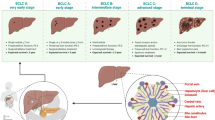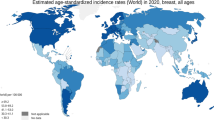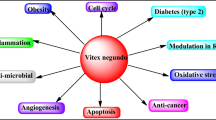Abstract
Background
Green tea has antioxidant, anti-tumor and anti-bacterial properties. Epigallocatechin-3-gallate (EGCG) in green tea is highly active as a cancer chemopreventive agent. In this study, we designed a series of experiments to examine the effects of EGCG on proliferation and apoptosis of estrogen receptor α-positive breast cancer (T47D) cells.
Methods
Cells were treated with EGCG (0–80 μM) and tamoxifen (0–20 μM), as the positive control, up to 72 h. Cell viability was determined by MTT assay. Apoptosis investigated by real time PCR of apoptosis and survival (Bax, Bcl-2, p21, p53, PTEN, PI3 K, AKT, caspase3 and caspase9 and hTERT) genes and by western blot of Bax/Bcl-2 proteins expressions.
Results
The results showed that EGCG decreased cell viability as concentration- and time-dependently. IC50 values were 14.17 μM for T47D and 193.10 μM for HFF cells, as compared with 3.39 μM and 32.75 μM for tamoxifen after 72 h treatment, respectively. Also, EGCG (80 μM) significantly increased the genes of PTEN, CASP3, CASP9 and decreased AKT approximately equal to tamoxifen. In gene expression, EGCG (80 μM) significantly increased Bax/Bcl-2 ratio to 8-fold vise 15-fold in tamoxifen (20 μM)-treated T47D cells during 72 h. In protein expression of Bax/Bcl-2, EGCG significantly increased 6-fold while this ratio augmented 10-fold in tamoxifen group. EGCG significantly decreased 0.8, 0.4 and 0.3 gene expression of hTERT in 24, 48 and 72 h, respectively.
Conclusions
This study suggests that EGCG may be a useful adjuvant therapeutic agent for the treatment of breast cancer.
Similar content being viewed by others
References
Mousavi SM, Gouya MM, Ramazani R, Davanlou M, Hajsadeghi N, Seddighi Z. Cancer incidence and mortality in Iran. Ann Oncol 2009;20:556–63.
Ahmad N, Cheng P, Mukhtar H. Cell cycle dysregulation by green tea polyphenol epigallocatechin-3-gallate. Biochem Biophys Res Commun 2000;275:328–34.
Xiang L-P, Wang A, Ye J-H, Zheng X-Q, Polito CA, Lu J-L, et al. Suppressive effects of tea catechins on breast cancer. Nutrients 2016;8:458.
Surh Y-J. Cancer chemoprevention with dietary phytochemicals. Nat Rev Cancer 2003;3:768–80.
Teiten M-H, Gaascht F, Dicato M, Diederich M. Anticancer bioactivity of compounds from medicinal plants used in European medieval traditions. Biochem Pharmacol 2013;86:1239–47.
Shu L, Cheung K-L, Khor TO, Chen C, Kong A-N. Phytochemicals: cancer chemoprevention and suppression of tumor onset and metastasis. Cancer Metastasis Rev 2010;29:483–502.
Saklani A, Kutty SK. Plant-derived compounds in clinical trials. Drug Discov Today 2008;13:161–71.
Gupta S, Hussain T, Mukhtar H. Molecular pathway for (—)-epigallocatechin-3-gallate-induced cell cycle arrest and apoptosis of human prostate carcinoma cells. Arch Biochem Biophys 2003;410:177–85.
Thielecke F, Boschmann M. The potential role of green tea catechins in the prevention of the metabolic syndrome-a review. Phytochemistry 2009;70:11–24.
Xiao J, Ho CT, Liong EC, Nanji AA, Leung TM, Lau TYH, et al. Epigallocatechin gallate attenuates fibrosis, oxidative stress, and inflammation in non-alcoholic fatty liver disease rat model through TGF/SMAD, PI3K/Akt/FoxO1, and NF-kappa B pathways. Eur J Nutr 2014;53:187–99.
Yang CS, Landau JM, Huang M-T, Newmark HL. Inhibition of carcinogenesis by dietary polyphenolic compounds. Annu Rev Nutr 2001;21:381–406.
Li M, Liu J-T, Pang X-M, Han C-J, Mao J-J. Epigallocatechin-3-gallate inhibits angiotensin II and interleukin-6-induced C-reactive protein production in macrophages. Pharmacol Rep 2012;64:912–8.
Zhou J, Farah BL, Sinha RA, Wu Y, Singh BK, Bay B-H, et al. Epigallocatechin-3-gallate (EGCG), a green tea polyphenol, stimulates hepatic autophagy and lipid clearance. PLoS One 2014;9:e87161.
Zeng L, Holly JM, Perks CM. Effects of physiological levels of the green tea extract epigallocatechin-3-gallate on breast cancer cells. Front Endocrinol 2014;5:61.
Hosseini A, Shafiee-Nick R, Mousavi SH. Combination of Nigella sativa with Glycyrrhiza glabra and Zingiber officinale augments their protective effects on doxorubicin-induced toxicity in h9c2 cells. Iran J Basic Med Sci 2014;17:993.
Pfaffl MW. Relative quantification. Real-time PCR 2006;63:63–82.
Sedghy F, Sankian M, Moghadam M, Ghasemi Z, Mahmoudi M, Varasteh A-R. Impact of traffic-related air pollution on the expression of Platanus orientalis pollen allergens. Int J Biometeorol 2017;61:1–9.
Braicu C, Pileczki V, Pop L, Petric RC, Chira S, Pointiere E, et al. Dual targeted therapy with p53 siRNA and Epigallocatechingallate in a triple negative breast cancer cell model. PLoS One 2015;10:e0120936.
Meeran SM, Patel SN, Chan T-H, Tollefsbol TO. A novel prodrug of epigallocatechin-3-gallate: differential epigenetic hTERT repression in human breast cancer cells. Cancer Prev Res 2011;4:1243–54.
Belguise K, Guo S, Sonenshein GE. Activation of FOXO3a by the green tea polyphenol epigallocatechin-3-gallate induces estrogen receptor α expression reversing invasive phenotype of breast cancer cells. Cancer Res 2007;67:5763–70.
Chen L, Lee M-J, Li H, Yang CS. Absorption, distribution, and elimination of tea polyphenols in rats. Drug Metab Dispos 1997;25:1045–50.
Isbrucker R, Edwards J, Wolz E, Davidovich A, Bausch J. Safety studies on epigallocatechin gallate (EGCG) preparations Part 2: dermal, acute and short-term toxicity studies. Food Chem Toxicol 2006;44:636–50.
Dvorakova K, Dorr RT, Valcic S, Timmermann B, Alberts DS. Pharmacokinetics of the green tea derivative, EGCG, by the topical route of administration in mouse and human skin. Cancer Chemother Pharmacol 1999;43:331–5.
Yang CS, Maliakal P, Meng X. Inhibition of carcinogenesis by tea*. Annu Rev Pharmacol Toxicol 2002;42:25–54.
Yeh C, Chen W, Chiang C, Lin-Shiau S, Lin J. Suppression of fatty acid synthase in MCF-7 breast cancer cells by tea and tea polyphenols: a possible mechanism for their hypolipidemic effects. Pharmacogenom J 2003;3:267–76.
Zhang G, Wang Y, Zhang Y, Wan X, Li J, Liu K, et al. Anti-cancer activities of tea epigallocatechin-3-gallate in breast cancer patients under radiotherapy. Curr Mol Med 2012;12:163–76.
Sartippour MR, Pietras R, Marquez-Garban DC, Chen H-W, Heber D, Henning SM, et al. The combination of green tea and tamoxifen is effective against breast cancer. Carcinogenesis 2006;27:2424–33.
Sakata M, Ikeda T, Imoto S, Jinno H, Kitagawa Y. Prevention of mammary carcinogenesis in C3H/OuJ mice by green tea and tamoxifen. Asian Pac J Cancer Prev 2011;12:567–71.
Scandlyn M, Stuart E, Somers-Edgar T, Menzies A, Rosengren R. A new role for tamoxifen in oestrogen receptor-negative breast cancer when it is combined with epigallocatechin gallate. Br J Cancer 2008;99:1056–63.
Chisholm K, Bray B, Rosengren R. Tamoxifen and epigallocatechin gallate are synergistically cytotoxic to MDA-MB-231 human breast cancer cells. Anticancer Drugs 2004;15:889–97.
Qiao J, Gu C, Shang W, Du J, Yin W, Zhu M, et al. Effect of green tea on pharmacokinetics of 5-fluorouracil in rats and pharmacodynamics in human cell lines in vitro. Food Chem Toxicol 2011;49:1410–5.
Shin S-C, Choi J-S. Effects of epigallocatechin gallate on the oral bioavailability and pharmacokinetics of tamoxifen and its main metabolite, 4-hydroxytamoxifen, in rats. Anticancer Drugs 2009;20:584–8.
Author information
Authors and Affiliations
Corresponding author
Rights and permissions
About this article
Cite this article
Moradzadeh, M., Hosseini, A., Erfanian, S. et al. Epigallocatechin-3-gallate promotes apoptosis in human breast cancer T47D cells through down-regulation of PI3K/AKT and Telomerase. Pharmacol. Rep 69, 924–928 (2017). https://doi.org/10.1016/j.pharep.2017.04.008
Received:
Revised:
Accepted:
Published:
Issue Date:
DOI: https://doi.org/10.1016/j.pharep.2017.04.008




